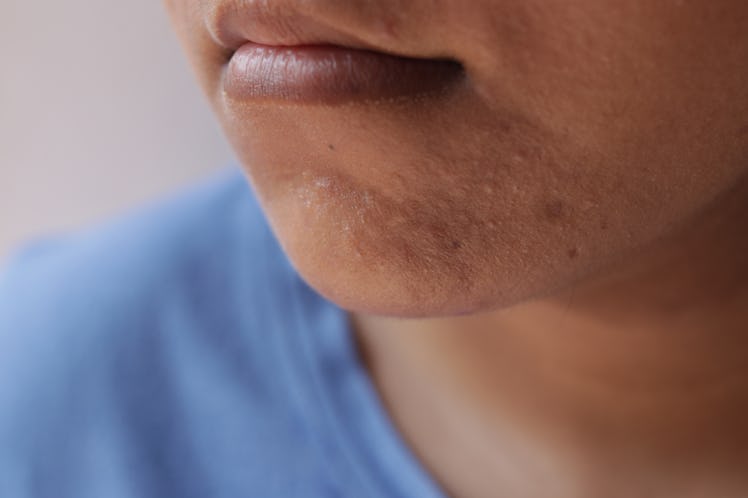
Here's Why Some People Just Can't Grow A Beard
These days, personal grooming style is more, well, personal than ever. Whether you like to go all in on body and facial hair or prefer to keep it sleek, you get to do you. Sometimes it’s not that easy, though, and you can’t grow the facial hair you want. For some beard-growers, it’s harder to grow out facial hair than it is for others, and the reason why some people can’t grow beards is pretty clear: it’s just how you’re made.
“The largest factor that determines beard growth is really genetics,” says Dr. Amy McMichael, a dermatologist at Wake Forest Baptist Health in Winston-Salem, North Carolina, who works with conditions like alopecia and hirsutism. “Some [people] simply have genetics such that hair follicles are sparse or hair growth is slow,” she tells Elite Daily.
When it comes to hair, you might have heard not being able to grow a beard can be blamed on a lack of testosterone, but in general, testosterone gets a little too much credit. “Testosterone does play a role in the signaling of hair growth, but the system does have limits,” says McMichael.
Dr. Kristen Irene Lo Sicco, a dermatologist with New York City’s NYU Langone Health and the associate director of the NYU Skin & Cancer Unit, explains this further. “In regards to facial hair, testosterone stimulates its growth and estrogens slow it,” she tells Elite Daily. In general, adult cisgender men have an average range of testosterone depending on their age. But as The New York Times highlighted in 2012, people with thick beards may be more sensitive to testosterone than their smooth-faced peers.
The most prominent effects of testosterone on beard growth would probably be seen on trans men taking supplemental testosterone. “Transgender men see the effects of [external] testosterone,” which may be taken in several forms, per Lo Sicco. But even if you’re taking external hormones, there’s no guarantee you’ll be able to grow a beard as the effects may vary from person to person. “Hair follicle sensitivity to androgens [including testosterone] varies, with facial hair follicles enlarging first above the lips and on the chin,” she says.
For the most part, McMichael calls low testosterone a “rare” cause of not being able to grow a beard. “Poor beard growth alone is rarely a signal of low testosterone,” she says. Moreover, if that is the cause, you’ll see a lot of other signs. “Because testosterone has a role in many other process[es], it is likely that other symptoms would be noticed as well if it were low,” she notes.
The capacity to grow a beard has little to do with manliness, virility, or testosterone levels, and everything to do with genetics. So blame mom and dad if you can't.
There are also a few conditions that could affect your beard growth. Both dermatologists bring up a condition called alopecia areata, an autoimmune form of hair loss characterized by patchy hair loss in an area that — importantly — previously had full hair growth. It most commonly presents as round and distinct patches of baldness, and can affect any part of your body that grows hair. There’s also the possibility of physical trauma to your beard area or even scarring from severe acne, which can affect the hair follicles in a beard. “If a certain disease process is causing hair loss, it is important to seek help from a dermatologist who can tailor a therapy regimen that's right for you,” advises Lo Sicco.
Overall, though, not being able to grow a beard isn't a medical issue, and there's not much you can or should do about it. “The idea that someone can change the number of hair follicles or diameter and density of hair shafts is a myth,” says McMichael. Another myth? That shaving will help. “Shaving does not increase hair growth and this is a long held myth that should be dispelled,” per McMichael. You should also be aware that while some topical treatments to promote hair growth are over the counter, Lo Sicco notes the more “potent” treatments, like steroid injections, need to be done in a doctor’s care.
Still, there is one very important thing you can do to promote beard growth: take care of yourself. “[People] should care for beards with the same delicacy [they] do [their] scalp hair,” says Lo Sicco. She recommends shampooing and conditioning your beard (with extra attention to curly hair, which is more prone to breakage). McMichael says to make sure you’re using a good, sharp razor when you do shave to prevent skin irritation.
So if you're currently surrounded by thick-bearded hipsters and feeling a little left out, be comforted in knowing you'll at least have nice, soft — if hairless — skin. Regardless, it's what's on the inside that counts, right?
Additional reporting by Lilli Petersen.
Experts cited:
Dr. Amy McMichael, MD, Dermatology Chair at Wake Forest School of Medicine
Dr. Kristen Lo Sicco, MD, Associate Director at the NYU Skin & Cancer Unit
This article was originally published on